|
|
|
Sort Order |
|
|
|
Items / Page
|
|
|
|
|
|
|
| Srl | Item |
| 1 |
ID:
189094
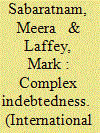

|
|
|
|
|
| Summary/Abstract |
A prominent feature of the contemporary crisis of the liberal international order is diverse calls for justice, including epistemic and historic justice. For a long time, that order understood itself in liberal terms and as capable of delivering justice accordingly. Asking a second-order question, about how questions of justice are framed in the international order, leads us to the conclusion that the liberal order's account of the connections that make the system hang together is partial, if not deeply flawed. Building on long-established and more recent traditions of scholarship aligned with the global South, we introduce a different account of international order and its core dynamics: complex indebtedness. Such an account enables not only a better appreciation of the justice claims currently being made in and against the liberal international order, it also more plausibly explains their origins, interconnections, and multiscalar and polymorphic character. By facing squarely the political parameters of indebtedness, we can make better sense of how to approach claims for justice in the present and future. The argument is illustrated with the examples of struggles for racial justice, white nationalism and South–South co-operation.
|
|
|
|
|
|
|
|
|
|
|
|
|
|
|
|
| 2 |
ID:
083537
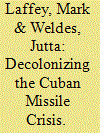

|
|
|
|
|
| Publication |
2008.
|
| Summary/Abstract |
Postcolonial scholars show how knowledge practices participate in the production and reproduction of international hierarchy. A common effect of such practices is to marginalize Third World and other subaltern points of view. For three decades, analysis of the Cuban missile crisis was dominated by a discursive framing produced in the ExComm, one in which Cuba was invisible. The effort to produce a critical oral history enabled Cuban voices-long excluded from interpretive debates about the events of October 1962-to challenge the myth of the crisis as a superpower affair. Despite the oral history project's postcolonial intervention, however, and greater attention to Cuba's role in the crisis, this framing persists and is reproduced in the micro-practices of scholarship. Decolonizing the crisis, and by extension the discipline itself, is not easy to do.
|
|
|
|
|
|
|
|
|
|
|
|
|
|
|
|
| 3 |
ID:
049638
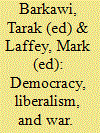

|
|
|
|
|
| Publication |
Boulder, Lynne Rienner Publishers, 2001.
|
| Description |
viii, 237p.
|
| Standard Number |
1555879551
|
|
|
|
|
|
|
|
|
|
|
|
Copies: C:1/I:0,R:0,Q:0
Circulation
| Accession# | Call# | Current Location | Status | Policy | Location |
| 045041 | 327.172/BAR 045041 | Main | On Shelf | General | |
|
|
|
|
| 4 |
ID:
117604
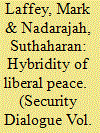

|
|
|
|
|
| Publication |
2012.
|
| Summary/Abstract |
Much contemporary analysis of world order rests on and reproduces a dualistic account of the international system, which is divided into liberal and non-liberal spaces, practices and subjectivities. Drawing on postcolonial thought, we challenge such dualisms in two ways. First, we argue that, as a specific form of governmental reason and practice produced at the intersection of the European and the non-European worlds, liberalism has always been hybrid, encompassing within its project both 'liberal' and 'non-liberal' spaces and practices. Second, through analysis of liberal engagement with diasporas, a specific set of subjects that occupy both these spaces, we show how contemporary practices of transnational security governance work to reproduce the hybridity of liberal peace. The article demonstrates the shifting conditions for local agency in relations and practices that transcend the simple dualism between liberal and non-liberal spaces, in the process showing how practices of transnational security governance also reproduce diasporas as hybrid subjects. The argument is illustrated with reference to the Tamil diaspora and the Sri Lankan state's war against the Liberation Tigers of Tamil Eelam.
|
|
|
|
|
|
|
|
|
|
|
|
|
|
|
|
| 5 |
ID:
071469
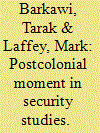

|
|
|
|
|
| Publication |
2006.
|
| Summary/Abstract |
In this article, we critique the Eurocentric character of security studies as it has developed since World War II. The taken-for-granted historical geographies that underpin security studies systematically misrepresent the role of the global South in security relations and lead to a distorted view of Europe and the West in world politics. Understanding security relations, past and present, requires acknowledging the mutual constitution of European and non-European worlds and their joint role in making history. The politics of Eurocentric security studies, those of the powerful, prevent adequate understanding of the nature or legitimacy of the armed resistance of the weak. Through analysis of the explanatory and political problems Eurocentrism generates, this article lays the groundwork for the development of a non-Eurocentric security studies.
|
|
|
|
|
|
|
|
|
|
|
|
|
|
|
|
| 6 |
ID:
100473


|
|
|
|
|
| Publication |
2010.
|
| Summary/Abstract |
Richard Ashley's writings in the 1980s are central to the production of post-structuralist or 'dissident' scholarship in International Relations (IR). In this article, I use analysis of the standard dissident view of Ashley's writings to examine the interpretive practices through which the community of dissident scholars was produced textually. Dissident 'thinking space' in the discipline was produced in part through the exclusion of Marx, capital and class, despite these being present in Ashley's writings throughout this period. Similar interpretive practices were applied to the writings of Michel Foucault, with similar effects. This exclusion has negative consequences for dissident scholarship, in particular analysis of historicity and the place of capitalism in contemporary world politics. Overcoming these problems requires reading the work of Ashley and other founders of dissident scholarship in a different way are attentive to the silences of thinking space.
|
|
|
|
|
|
|
|
|
|
|
|
|
|
|
|
|
|
|
|
|